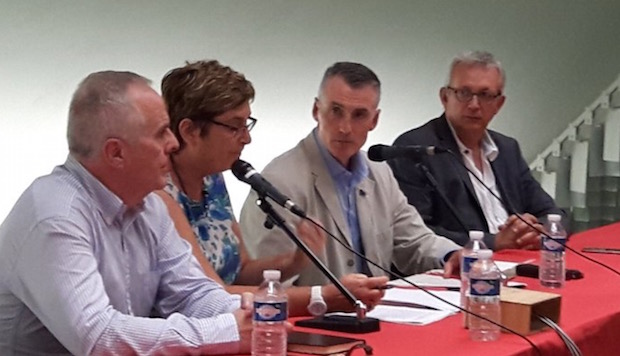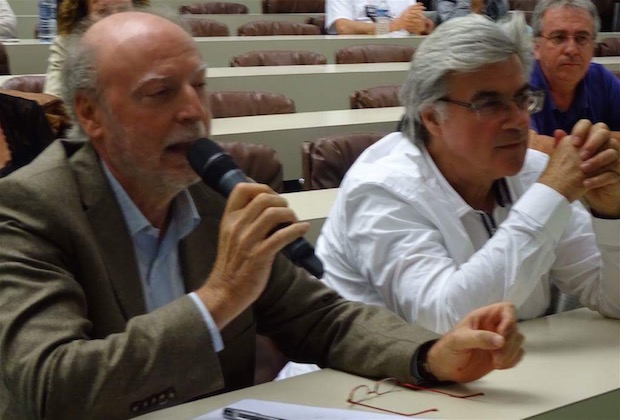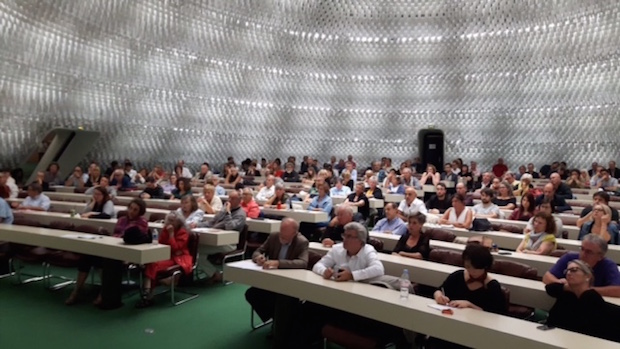28 September 2016
International solidarity and support is essential to achieve Irish unity
Sinn Féin MLAs Declan Kearney and Raymond McCartney in Paris to discuss 1916, 1981 and 2016
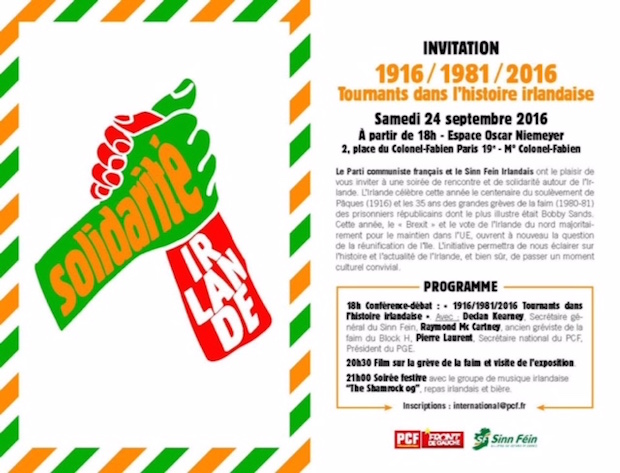
IN the evocative video on the republican struggle and the 1981 Hunger Strike, Owen Carron says:
“Thousands of people walked down the Champs Elysee in Paris in protest when Bobby Sands died.”
Raymond McCartney and I travelled to Paris last Saturday at the invitation of the French Communist Party (PCF) to take part in a political and cultural programme of events to commemorate the sacrifice of the Hunger Strike martyrs and discuss the historic political watersheds of 1916 and 1981.
A panel and plenary discussion discussed these events and the new watershed and significance of Brexit and what that means for the future.
Raymond and I spoke alongside Pierre Laurent (General Secretary of the PCF) and Anne Sabourin (European Policy PCF and Executive member of European Left) on a panel which discussed all these seminal events.
The Hunger Strike galvanised unprecedented international solidarity for the Irish republican POWs in the H-Blocks and Armagh Prison.
Pierre (pictured) and many others in the large audience were themselves directly involved in France in acts of solidarity with the protesting prisoners during 1980/81. He spoke of how they were moved by events in Ireland.
Francis Wurtz (pictured below), a former PCF MEP, also spoke from the audience. Francis had travelled to Belfast to attend Bobby Sands’s funeral.
International solidarity has been and remains an essential element of the successful promotion of the struggle for Irish national democracy and equality.
One key element which was central to the emergence of the Irish Peace Process was the role of positive, strategic, international influence, particularly from North America and the Irish-American Diaspora as well as from Europe and elsewhere.
As a result, today the Irish Peace Process is the most important project in Ireland.
● The audience at the PCF event
The Good Friday Agreement (1998) created an entirely new political context.
Its significance was in recognising that the status quo was not an option and that shaping the future would depend upon the management of change through democratic compromise and agreement.
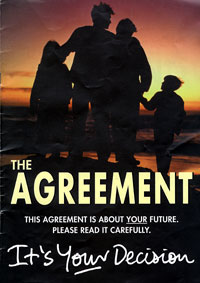
The sovereignty of the British Parliament over national territorial reunification was removed. In future, this would be determined in Border polls, Irish unity referenda North and South, and requiring a pro-unity majority in both states.
Nothing could or would remain the same.
From the beginning, political unionism failed to unconditionally support this framework.
The effect of entrenched negative resistance to change has been to slow down and frustrate the democratic transformation of the North which began with the Peace Process.
Importantly, this has been exacerbated by the failure of both the British and Irish governments to fulfil all of their obligations under the terms of the Good Friday Agreement.
British Government policy has damaged the political process in the North.
The same powerful sections of the British security and military establishment which directed Britain’s ‘dirty war’ in Ireland still exert a huge influence over British state policy. They do not want progress.
Those who were always hostile to the Peace Process within the British Ministry of Defence and security services in Whitehall are still politically and psychologically at war with the Sinn Féin party leadership.
The strategic lesson from the last six years in the North is that the Irish Peace Process cannot be taken for granted.
The British and Irish governments must fulfil their responsibilities to both the peace and political processes, and on a fair and even-handed basis, to avoid the development of serious political problems.
In June this year the referendum on Britain’s membership of the EU dramatically changed the Irish political and economic landscape once more.
The majority of voters in the north of Ireland and across the political spectrum voted to remain in Europe. Despite that outcome, the expressed democratic will of the North is now being overruled and subverted by a vote in England.
That is unacceptable to Sinn Féin.
It is also unacceptable to the greater majority of opinion in the North and South of Ireland.
While Sinn Féin has a critical analysis of the EU, we believe the required reforms can only be made inside its institutions. In that strategic sense, Ireland is better within rather than outside the EU.
Brexit is the price of Ireland’s continued partition.
The imperative for the North’s political institutions must be to stand up for local democracy and against austerity.
The regional coalition government and Assembly must respect and underpin the democratic decision of voters in the North.
Following the result of the referendum, Sinn Féin requested that the Taoiseach convene an all-Ireland forum to bring forward concrete proposals to secure the North of Ireland’s place within the EU. The recent announcement that this forum will be convened in November is to be welcomed.
It is unacceptable that the North be removed from the EU while the rest of Ireland remains.
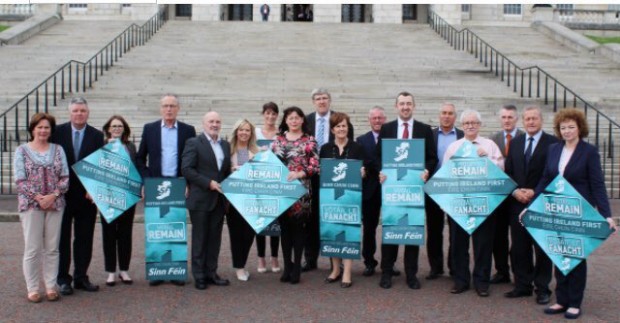
Brexit has once more brought into sharp focus the contradiction of partition at the heart of Irish politics. This directly challenges democracy and Irish national interests.
However, it has also begun an equally unprecedented political and civic discussion in Ireland.
A huge re-evaluation has been provoked about the island’s economic and political future.
A positive, national conversation about how our constitutional, political and economic future can be reimagined and redesigned is required.
A real potential has emerged to enable a new popular and inclusive conversation in Ireland about our shared future – about a new relationship between Ireland and Britain, and between the island of Ireland, Europe itself, and the international community.
Ireland’s future, North and South, should be allowed to evolve in the context of new, progressive, democratic international relationships based upon social solidarity and mutual democratic co-operation.
Brexit challenges all of the old assumptions about the previous constitutional, political and economic status quo in the north and south of Ireland.
A strategic opportunity exists to maximise the democratic argument for an end to Ireland’s partition and to persuade for Irish unity, both domestically and internationally.
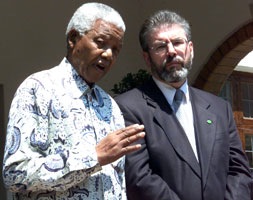
The Peace Process was facilitated and supported by international goodwill, support and diplomacy. The international community still has an essential role to play in continuing to consolidate the Peace Process and encouraging reconciliation and healing.
A new phase of political change has arrived and the significant strategic political influence of the international community should now assist with planning for the transition towards a new, agreed, united Ireland.
It is time to end the division of Ireland and prepare the transition to Irish unity.
A positive international axis to encourage, persuade for and support that aim is now needed.
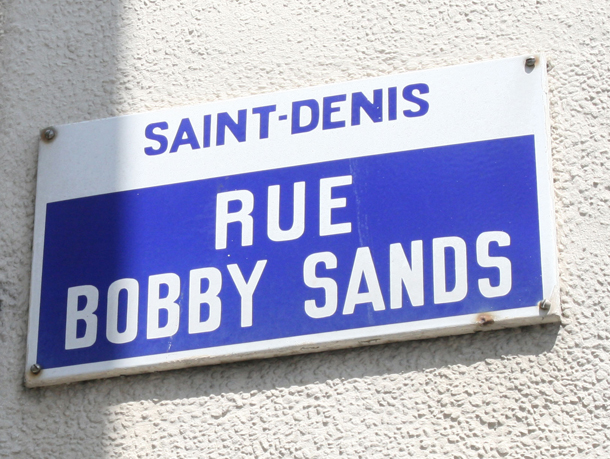
Follow us on Facebook
An Phoblacht on Twitter
Uncomfortable Conversations

An initiative for dialogue
for reconciliation
— — — — — — —
Contributions from key figures in the churches, academia and wider civic society as well as senior republican figures




